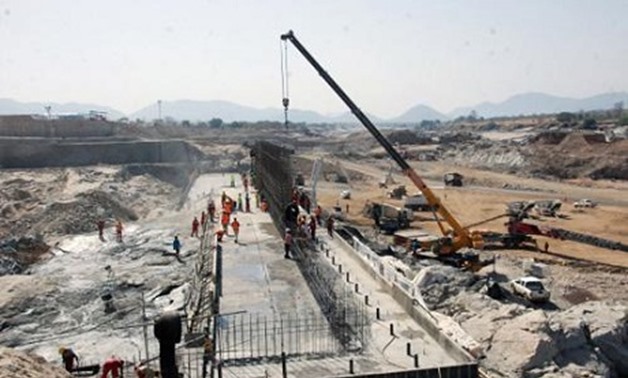
Grand Ethiopian Renaissance Dam construction (Photo: Reuters)
CAIRO – 5 May 2018: The technical committee of the Nile Basin countries of Ethiopia, Sudan and Egypt, and their respective irrigation ministers, resume talks over the Grand Ethiopian Renaissance Dam (GERD) on Saturday in Addis Ababa.
On Friday, Egypt's Irrigation Minister Mohamed Abdel-Ati jetted off to Addis Ababa to be in attendance.
Mohamed Abdel Rahman Jawish, spokesperson for the Sudanese minister of irrigation and water resources, said in press remarks on Friday that the French consultancy firm selected jointly by the three countries to determine the effects of the underway dam on the downstream countries will also expectedly join Saturday’s meetings.
The meeting, which comes at the request of Egypt to streamline frozen negotiations, is expectedly to reach a consensus over the introductory report prepared by two French consultancy firms, BRL and Arterlia, which were hired to conduct impact studies of the dam on the downstream countries.
During a press conference with Ethiopian Prime Minister Abi Ahmed, Sudanese President Omar al-Bashir affirmed that the new project benefited his country on a large scale and will not affect Egypt’s share of Nile water.
Both officials reiterated their commitment to the principles of the 2015 agreement that ensures a fair and equitable distribution of Nile water among the said countries.
Previously, amid a serious deadlock in talks over the stalling of the technical studies of the disputed dam, Egypt suggested including the World Bank as a neutral mediator in the tripartite technical committee’s talks on the GERD.
However, on January 21, Ethiopia announced its rejection of the suggestion.
Egypt depends entirely on Nile water for drinking and irrigation purposes, reiterating consistently its "historical right" to the river guaranteed in the 1929 and 1959 Nile agreements, which granted the country 87 percent of Nile water and the right to veto or approve irrigation projects in the upstream countries.
Since 2014, the three countries have held several tripartite meetings and agreed on the Declaration of Principles. However, the difference between the countries relates to the filling and operation of the dam; Egypt demands that this period be 7 to 10 years, while Ethiopia insists on a maximum of 3 years
Egypt’s average water per-capita is expected to drop from 663 cubic meters per year to 582 cubic meters by 2025, according to the Central Agency for Public Mobilization and Statistics (CAPMAS). Addis Ababa, however, claimed that the dam is necessary for Ethiopia’s development and will not harm downstream countries.
In 2011, Ethiopia started the construction of the 6,000-megawatt Renaissance Dam over the Blue Nile River, one of the major sources of water that forms the Nile River downstream. Concerns have risen in Cairo and Khartoum over the negative impact the Ethiopian dam will have on their historic Nile water share, amounting to 55.5 billion cubic meters in Egypt only, in accordance with the historic 1959 agreement with Sudan.

Comments
Leave a Comment